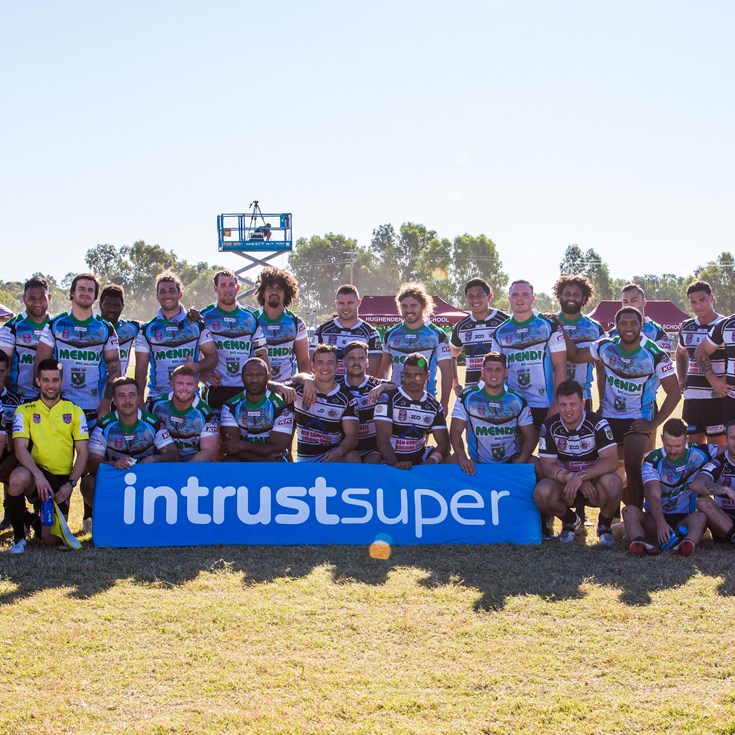Meet the former NRL player who is now an internationally-based bariatric surgeon.
Scott Whiting is living proof that, not only is there life after football, but there is always opportunity to profoundly impact other people's lives to an even greater degree.
Whiting played 15 NRL matches for the North Queensland Cowboys between 1998 and 2003, also appearing in the Intrust Super Cup for Townsville, Brisbane Wests and the NQ Young Guns.
Now undertaking an international fellowship in bariatric and metabolic surgery in Auckland, he says the theatre of professional sport and the operating theatre share more than a few common traits.
"With professional sport, there is almost nothing like it when it comes to being judged on performance," says Whiting, now aged 40.
"In rugby league, if you make a mistake you can watch it six times on the replay screen while you are still on the field.
"You are under constant scrutiny and pressure to perform, whereas that environment in most other jobs could be considered antagonistic or angst-ridden.
"I guess I kind of thrive on that pressure and wanted an occupation where there is honest feedback, where you accept what you need to focus on."
Nicknamed 'Brains' and 'Egg' by teammates during his days at the Cowboys, Whiting is quick to point out that he wasn't always a standout student.
He graduated from Townsville State High with an above-average but not exceptional OP 9.
He also changed careers and study choices multiple times, not always seeing things through to completion.
"Absolutely, your high school grades do not define you as a person and there is always time to make amends," says Whiting.
"It's the same thing with football. If you base success on how many NRL or representative games you play, I think you miss out on the true value of the game and what it teaches you.
"I guess I was lucky in the aspect that, even when I got heavily involved with rugby league, I kept a lot of my mates who were doing well at school.
"I was around people who were always intending on going to university and being a good student was something I did see as important."
Whiting found he had innate talent for retaining information about biology from a young age.
He first started out studying biomedical science while he was with the Cowboys, transferring to a degree in sport and exercise science.
In 1999 he attempted to undertake an honours course, but experienced injury and distractions with football that curtailed his ambition.
From there he took a job at Cleveland Youth Detention Centre in Townsville's northern suburbs, providing troubled youth with physical programs to improve their mindset.
"That was an opportunity I learnt a lot from and I worked there until I finished playing football," he says.
"It was a turning point because I was finding, I guess a little surprisingly, that it wasn't necessarily the gym programs that I was creating that interested me most, but more the lifestyle outcomes.
"From there I got a job in the Queensland Government Department of Communities and used my research background to deliver reports about family services."
But then, Whiting hit another decisive juncture that led him down his current path.
"The critical moment was that I used to get told I needed to have a report done and on the Director-General's desk by the morning," says Whiting.
"That kind of thing would happen a fair bit, but then I realised after a while that these reports would sit on a desk and nothing would ever be done, so I wasn't really changing anything."
Inspired by a friend who progressed through medical school, Whiting backed himself to conquer the same challenge.
He sat his Graduate Medical School Admissions Test (GAMSAT) and moved to the other side of the country to attend The University of Notre Dame in Western Australia.
After five years of ploughing through course work, he then conducted an internship and residency before starting as a trainee surgeon in 2013.
In all it has taken more than a decade for him to emerge as a fully qualified surgeon.

"I do think I had unfinished business from rugby league and never quite achieved what I wanted," says Whiting.
"This has been something I wanted to do to challenge myself.
"You do have a phase when you start out in surgery that is quite confronting, but now I see an operation as a series of steps, with some landmarks along the way which influence your actions.
"There is a process to follow, and while I try not to dehumanise patients, I guess you do have to disassociate yourself a bit or it would be very hard to get through."
For players in the Intrust Super Cup, like recently retired Stargroth Amean, who left the PNG Hunters to pursue medical science, Whiting's story is an inspirational one.
He gives credit to his wife and family for their understanding over many gruelling (and rewarding) years of graft, yet it also comes down to his strong sense of self-determination.
"At the back of my mind, I thought 'Why can't that be me?'," he says.






